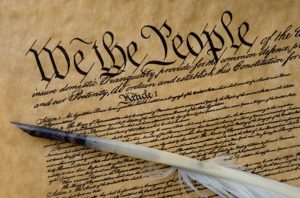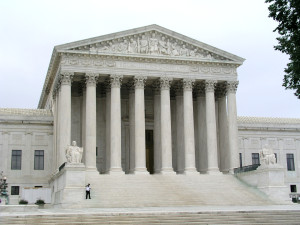The tragic and senseless massacre that unfolded this past Valentine’s Day at Marjory Stoneman Douglas High School in Parkland Florida has left a grieving Nation searching for answers. Much of the debate focuses on the Second Amendment to the United States Constitution which states: “A well regulated Militia, being necessary to the security of a free State, the right of the people to keep and bear Arms, shall not be infringed.” History has shown that the strong language of the Second Amendment does not leave it immune from lawmakers enacting safeguards in an attempt to keep guns from falling into the wrong hands. For example, federal law prohibits any person convicted of a misdemeanor crime of “domestic violence” from possessing a firearm. 18 U. S. C. §922(g)(9). That phrase is defined to include any misdemeanor committed against a domestic relation that necessarily involves the use . . . of physical force.’ §921(a)(33)(A). Moreover, misdemeanor assault convictions for reckless (as contrasted to knowing or intentional) conduct also triggers the statutory firearms ban. Voisine v. United States, 136 S. Ct. 2272, 2276. In the Voisine case, Supreme Court Justice Elena Kagan explains “Congress enacted §922(g)(9) some 20 years ago to “close [a] dangerous loophole” in the gun control laws. United States v. Castleman, 572 U. S. ___, ___, 134 S. Ct. 1405, 188 L. Ed. 2d 426, 432 (2014) (quoting United States v. Hayes, 555 U. S. 415, 426, 129 S. Ct. 1079, 172 L. Ed. 2d 816 (2009)). An existing provision already barred convicted felons from possessing firearms. See §922(g)(1) (1994 ed.). But many perpetrators of domestic violence are charged with misdemeanors rather than felonies, notwithstanding the harmfulness of their conduct. See Castleman, 572 U. S., at ___, 134 S. Ct. 1405, 188 L. Ed. 2d 426, 432. And ‘[f]irearms and domestic strife are a potentially deadly combination.’ Hayes, 555 U. S., at 427, 129 S. Ct. 1079, 172 L. Ed. 2d 816. Accordingly, Congress added §922(g)(9) to prohibit any person convicted of a ‘misdemeanor crime of domestic violence’ from possessing any gun or ammunition with a connection to interstate commerce. And it defined that phrase, in §921(a)(33)(A), to include a misdemeanor under federal, state, or tribal law, committed by a person with a specified domestic relationship with the victim, that ‘has, as an element, the use or attempted use of physical force.'”Voisine v. United States, 136 S. Ct. 2272, 2276.
the United States Constitution which states: “A well regulated Militia, being necessary to the security of a free State, the right of the people to keep and bear Arms, shall not be infringed.” History has shown that the strong language of the Second Amendment does not leave it immune from lawmakers enacting safeguards in an attempt to keep guns from falling into the wrong hands. For example, federal law prohibits any person convicted of a misdemeanor crime of “domestic violence” from possessing a firearm. 18 U. S. C. §922(g)(9). That phrase is defined to include any misdemeanor committed against a domestic relation that necessarily involves the use . . . of physical force.’ §921(a)(33)(A). Moreover, misdemeanor assault convictions for reckless (as contrasted to knowing or intentional) conduct also triggers the statutory firearms ban. Voisine v. United States, 136 S. Ct. 2272, 2276. In the Voisine case, Supreme Court Justice Elena Kagan explains “Congress enacted §922(g)(9) some 20 years ago to “close [a] dangerous loophole” in the gun control laws. United States v. Castleman, 572 U. S. ___, ___, 134 S. Ct. 1405, 188 L. Ed. 2d 426, 432 (2014) (quoting United States v. Hayes, 555 U. S. 415, 426, 129 S. Ct. 1079, 172 L. Ed. 2d 816 (2009)). An existing provision already barred convicted felons from possessing firearms. See §922(g)(1) (1994 ed.). But many perpetrators of domestic violence are charged with misdemeanors rather than felonies, notwithstanding the harmfulness of their conduct. See Castleman, 572 U. S., at ___, 134 S. Ct. 1405, 188 L. Ed. 2d 426, 432. And ‘[f]irearms and domestic strife are a potentially deadly combination.’ Hayes, 555 U. S., at 427, 129 S. Ct. 1079, 172 L. Ed. 2d 816. Accordingly, Congress added §922(g)(9) to prohibit any person convicted of a ‘misdemeanor crime of domestic violence’ from possessing any gun or ammunition with a connection to interstate commerce. And it defined that phrase, in §921(a)(33)(A), to include a misdemeanor under federal, state, or tribal law, committed by a person with a specified domestic relationship with the victim, that ‘has, as an element, the use or attempted use of physical force.'”Voisine v. United States, 136 S. Ct. 2272, 2276.
Moreover, in New Jersey, N.J.S.A. 2C:58-3(c) states “no person of good character and good repute in the community in which he lives” shall be denied a permit to purchase a handgun or a firearms purchaser identification card, unless they are disqualified as defined by the statute. In pertinent part, N.J.S.A. 2C:58-3(c)(5) states that “[n]o handgun purchase permit or firearms purchaser identification card shall be issued . . . [t]o any person where the issuance would not be in the interest of the public health, safety, or welfare[.]” This disqualifier “is ‘intended to relate to cases of individual unfitness, where, though not dealt with in the specific statutory enumerations, the issuance of the permit or identification card would nonetheless be contrary to the public interest.'” In re Osworth, 365 N.J. Super. 72, 79, 838 A.2d 465 (App. Div. 2003) (quoting Burton v. Sills, 53 N.J. 86, 91, 248 A.2d 521 (1968). These disabilities apply to “any person where the issuance would not be in the interest of the public health, safety or welfare,” and “any person whose firearm is seized pursuant to the Prevention of Domestic Violence Act of 1991 . . . and whose firearm has not been returned[.]” N.J.S.A. 2C:58-3(c)(5) and (8); see also N.J.A.C. 13:54-1.5(a)(5). “[T]he statutory design is to prevent firearms from coming into the hands of persons likely to pose a danger to the public.” State v. Cunningham, 186 N.J. Super. 502, 511 (App. Div. 1982). ). “This broadly worded disqualification criterion eludes precise definition. We are satisfied, however, that it must be liberally construed.” State v. Cordoma, 372 N.J. Super. 524, 534, 859 A.2d 756 (App. Div. 2004). Thus, a judicial declaration that a defendant poses a threat to the public health, safety or welfare involves, by necessity, a fact-sensitive analysis. It requires a careful consideration of both the individual history of defendant’s interaction with the former plaintiff in the domestic violence matter, as well as an assessment of the threat a defendant may impose to the general public. Id. at 535.
When a handgun purchase permit or a firearms purchaser identification card is denied, the burden is on the police chief to establish good cause for the denial by a preponderance of the evidence. Weston v. State, 60 N.J. 36, 46, 286 A.2d 43 (1972). In “evaluating the facts presented by the Chief, and the reasons given for rejection of the application, the court should give appropriate consideration to the Chief’s investigative experience and to any expertise he appears to have developed in administering the statute.” Ibid. A trial court must grant the State’s forfeiture motion if it establishes, by a preponderance of the evidence, that the return of the weapons seized “would not be ‘in the interest of the public health, safety or welfare.'” In re Forfeiture of Pers. Weapons & Firearms Identification Card belonging to F.M., 225 N.J. 487, 513, 139 A.3d 67 (2016) (quoting N.J.S.A. 2C:58-3(c)(5)).
(1972). In “evaluating the facts presented by the Chief, and the reasons given for rejection of the application, the court should give appropriate consideration to the Chief’s investigative experience and to any expertise he appears to have developed in administering the statute.” Ibid. A trial court must grant the State’s forfeiture motion if it establishes, by a preponderance of the evidence, that the return of the weapons seized “would not be ‘in the interest of the public health, safety or welfare.'” In re Forfeiture of Pers. Weapons & Firearms Identification Card belonging to F.M., 225 N.J. 487, 513, 139 A.3d 67 (2016) (quoting N.J.S.A. 2C:58-3(c)(5)).
The issue of regulating gun ownership is as old as the history of the United States of America. The debate should not pit neighbor against neighbor or worse family member against family member. Instead, we owe it to ourselves to practice a civil discourse that moves the ball forward towards the common good with open minds and open hearts.
 New Jersey Divorce and Family Lawyer Blog
New Jersey Divorce and Family Lawyer Blog

